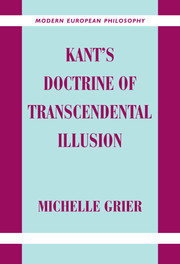Book contents
- Frontmatter
- Contents
- Acknowledgments
- Note on References and Translations
- Introduction
- PART ONE KANT'S DISCOVERY OF METAPHYSICAL ILLUSION
- PART TWO FALLACIES AND ILLUSIONS IN THE CRITIQUE OF PURE REASON
- PART THREE THE DIALECTICAL INFERENCES OF PURE REASON
- 5 Rational Psychology and the Pseudorational Idea of the Soul
- 6 Rational Cosmology and the Pseudoempirical Idea of the World
- 7 Rational Theology and the Pseudorational Idea of God
- PART FOUR ILLUSION AND SYSTEMATICITY
- Conclusion
- Selected Bibligraphy
- Index
5 - Rational Psychology and the Pseudorational Idea of the Soul
Published online by Cambridge University Press: 30 September 2009
- Frontmatter
- Contents
- Acknowledgments
- Note on References and Translations
- Introduction
- PART ONE KANT'S DISCOVERY OF METAPHYSICAL ILLUSION
- PART TWO FALLACIES AND ILLUSIONS IN THE CRITIQUE OF PURE REASON
- PART THREE THE DIALECTICAL INFERENCES OF PURE REASON
- 5 Rational Psychology and the Pseudorational Idea of the Soul
- 6 Rational Cosmology and the Pseudoempirical Idea of the World
- 7 Rational Theology and the Pseudorational Idea of God
- PART FOUR ILLUSION AND SYSTEMATICITY
- Conclusion
- Selected Bibligraphy
- Index
Summary
We saw in the preceding chapter that the doctrine of illusion is central to Kant's theory of the intellect, or reason. At the heart of that theory is the view that reason is, by nature, constrained to seek knowledge that transcends any or all particular experiences, and that it seeks such knowledge by means of a system of ideas that provides a set of ultimate explanatory principles. Although these ideas are viewed by Kant as necessary, they also carry with them a certain unavoidable illusion. In line with this Kant claims that the conclusions drawn by the dogmatic metaphysicians in the specialized domains of rational psychology, cosmology, and theology are all based on a species of this illusion.
In this connection, it is crucial to keep in mind the distinction between the illusions and the fallacies of the Dialectic. Once again, Kant's position is that on the basis of an “unavoidable illusion” the metaphysician succumbs to formally fallacious reasoning or, what is for Kant correlated with this, to a transcendental misapplication of concepts. The fallacies of the Dialectic, however, are not unavoidable but flow (additionally) from the metaphysician's transcendental realism – that is, his failure to distinguish between appearances and things in themselves. Hence, in explicating these fallacies, I hope to show how Kant's doctrine of illusion provides the basis for, but is to be distinguished from, both transcendental realism and the faulty judgments and conclusions of dogmatic metaphysics.
- Type
- Chapter
- Information
- Kant's Doctrine of Transcendental Illusion , pp. 143 - 171Publisher: Cambridge University PressPrint publication year: 2001



